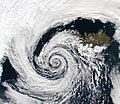The 2001–02 South-West Indian Ocean cyclone season had the earliest named storm since 1992. Many storms formed in the north-east portion of the basin,...
56 KB (4,475 words) - 05:55, 28 August 2024
In the south-west Indian Ocean, tropical cyclones form south of the equator and west of 90° E to the coast of Africa. In 1946, Réunion's first airstrip...
34 KB (1,528 words) - 04:22, 17 November 2024
The 2003–04 South-West Indian Ocean cyclone season featured the most intense tropical cyclone in the South-West Indian Ocean, Cyclone Gafilo, as well...
55 KB (5,085 words) - 07:09, 24 June 2024
The 2001–02 South Pacific cyclone season was a below-average year in which only five named storms formed or entered the South Pacific basin. It began...
42 KB (3,723 words) - 00:28, 16 June 2024
Intense tropical cyclone is the second-highest classification used within the South-West Indian Ocean to classify tropical cyclones with and are amongst...
73 KB (3,564 words) - 09:08, 19 November 2024
The 1993–94 South-West Indian Ocean cyclone season was the most active season in the basin since the start of reliable satellite coverage in 1967, until...
57 KB (5,569 words) - 20:20, 29 August 2024
The 1999–2000 South-West Indian Ocean tropical cyclone season was the first on record in which two storms – Leon–Eline and Hudah – struck Mozambique at...
68 KB (6,303 words) - 05:21, 18 December 2023
2002–03 South-West Indian Ocean cyclone season was one of the longest lasting and the third-most active season in the South-West Indian Ocean. Storms...
63 KB (5,868 words) - 21:17, 2 October 2024
Bako. Cyclone Bessi-Bako later reached its peak intensity of 65 knots as estimated by Météo-France; see 2001–02 South-West Indian Ocean cyclone season. A...
43 KB (3,764 words) - 16:47, 15 December 2023
The 2001 North Indian Ocean cyclone season was fairly quiet, although activity was evenly spread between the Arabian Sea and the Bay of Bengal. There were...
30 KB (2,807 words) - 06:27, 23 November 2024
The 2000–01 South-West Indian Ocean cyclone season was a fairly quiet season with only five named storms, although there was an additional unnamed tropical...
49 KB (4,970 words) - 23:48, 20 February 2024
In the Indian Ocean north of the equator, tropical cyclones can form throughout the year on either side of the Indian subcontinent, although most frequently...
49 KB (2,414 words) - 23:59, 11 November 2024
The 1999 North Indian Ocean cyclone season was an extremely active and deadly tropical cyclone season in recent times. It was an event in the annual cycle...
22 KB (1,604 words) - 13:09, 7 November 2024
Very Intense Tropical Cyclone Hary was the strongest tropical cyclone in the 2001–02 South-West Indian Ocean cyclone season. Developing on March 5 from...
15 KB (1,635 words) - 15:00, 30 August 2024
month of May in the south-west Indian Ocean. The final named storm of the busy 2001–02 South-West Indian Ocean cyclone season, Kesiny formed on May 2 from...
16 KB (1,750 words) - 16:54, 14 July 2024
Category 1 hurricane. On August 15, a rare early-season cyclone formed in the South-West Indian Ocean. Two days later, Tropical Storm Jongdari formed east...
127 KB (10,265 words) - 19:35, 25 November 2024
the north of Indian Ocean that is the most vulnerable to getting hit by tropical cyclones in the basin, from the east or from the west. On average, 2–3...
97 KB (10,892 words) - 17:16, 11 November 2024
the Southern Indian Ocean or the South Pacific Ocean. Within the Southern Hemisphere there are officially three areas where tropical cyclones develop on...
40 KB (1,430 words) - 06:43, 27 October 2024
During 2001, tropical cyclones formed in seven different areas called basins, located within various parts of the Atlantic, Pacific and Indian Oceans. A total...
41 KB (809 words) - 07:23, 11 October 2024
official tropical cyclone lists in the north Atlantic basin. Subtropical cyclones are also recognized in the south-west Indian Ocean and south Atlantic basins...
36 KB (3,760 words) - 11:26, 17 October 2024
cyclone in the South-West Indian Ocean was Cyclone Gafilo. By 10-minute sustained wind speed, the strongest tropical cyclone in the South-West Indian...
78 KB (1,888 words) - 02:47, 5 November 2024
The 2002 North Indian Ocean cyclone season was a below average season in terms of tropical cyclone formation. The season had no official bounds, but most...
28 KB (2,393 words) - 22:03, 7 November 2024
North Indian Ocean cyclone South Pacific cyclone Australian region cyclone South-West Indian Ocean cyclone A polar, sub-polar, or Arctic cyclone (also...
52 KB (5,138 words) - 03:08, 31 October 2024
multiple cyclones that ravaged East Africa in 2019, killing thousands. The unusually active 2018-2019 South-West Indian Ocean cyclone season was aided...
20 KB (2,140 words) - 21:26, 15 November 2024
The 2003 North Indian Ocean cyclone season was the last season that tropical cyclones were not publicly labeled by India Meteorological Department (IMD)...
33 KB (2,933 words) - 07:12, 16 August 2024
The 2000 North Indian Ocean cyclone season was fairly quiet compared to the year before, 1999 North Indian Ocean cyclone season, with all of the activity...
31 KB (2,958 words) - 23:05, 25 August 2024
BoM. The season was more active in 2003; for more information see Tropical cyclones in 2003. The 2001–02 South-West Indian Ocean cyclone season was very...
121 KB (6,892 words) - 00:48, 8 November 2024
2001–02 Southern Hemisphere tropical cyclone season comprises three different basins. Their respective seasons are: 2001–02 South-West Indian Ocean cyclone...
565 bytes (88 words) - 19:11, 3 January 2024
2024 Pacific typhoon season is an ongoing event in the annual cycle of tropical cyclone formation in the western Pacific Ocean. It is the fifth-latest...
234 KB (21,426 words) - 16:23, 25 November 2024
Within the South-West Indian Ocean, the term tropical cyclone is reserved for those systems, that have winds of at least 65 knots (120 km/h; 75 mph). It...
18 KB (735 words) - 16:08, 6 September 2024




























